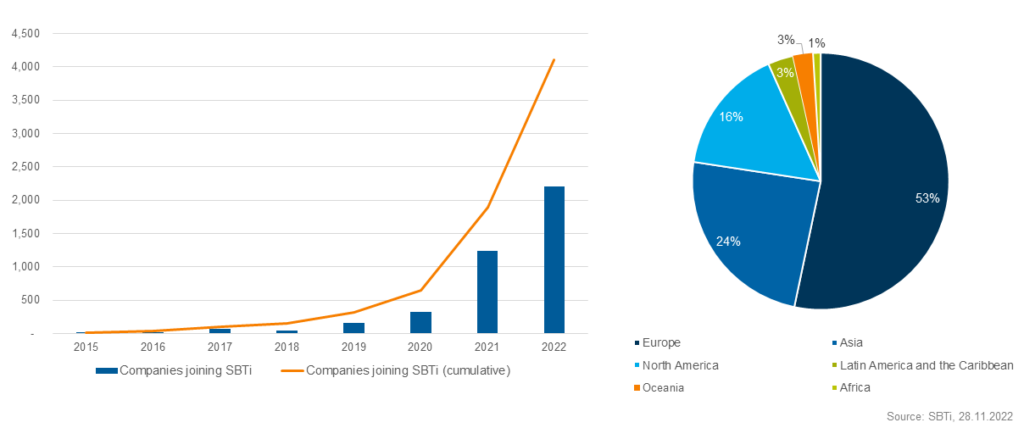On March 20, 2023, the IPCC’s overarching final report, the AR6 Synthesis Report, was released, and again emphasized the urgency of climate action[1]. To address this concern, many companies have adopted sustainability strategies to reduce their environmental impact and become more socially responsible. One such strategy is the adoption of science-based targets.
Science-based targets and the initiative in a nutshell
Science-based targets (SBTs) are specific, measurable goals that companies set to reduce their greenhouse gas (GHG) emissions in line with what the latest climate science says is necessary to limit global warming to well below 2°C above pre-industrial levels, and to pursue efforts to limit warming to 1.5°C.
The Science Based Targets initiative (SBTi) is a collaboration between CDP, the United Nations Global Compact (UNGC), World Resources Institute (WRI), and World Wide Fund for Nature (WWF). The initiative provides companies with a framework to set science-based targets and helps them to develop and implement strategies to achieve those targets.
By setting science-based targets, companies can demonstrate their commitment to sustainability and take a leadership role in the transition to a low-carbon economy. They can also reap the benefits of reduced costs and increased efficiency that come with implementing sustainable practices.
Growing interest in SBTs
The SBTi is seeing growing numbers of participating companies setting reduction targets in line with the 1.5°C pathway. Currently in 2023[2]:
- more than 4,800 companies committed themselves to submit targets in the next 24 months
- of these commitments more than 1,700 companies also submitted a Net Zero commitment and
- almost 2,500 targets have already been validated by the SBT.
Especially in recent years, the numbers of participating companies have risen sharply. European companies in particular lead the field here and engage in climate action.

SBTi: achievements of 2022 and what comes next
Updated SBTi criteria
In July 2022, the new SBTi criteria (version 5) came into force and thus replaced the previous version 4.2. The main changes included:
- increasing the minimum scope 1 and 2 ambition temperature classification from well below 2°C to 1.5°C.
- increasing the minimum scope 3 ambition temperature classification from 2°C to well below 2°C.
- shortening the timeframe for targets from 15 to 10 years.
In April of this year, the update version 5.1 was released, in which, however, mainly language and definition adjustments are made to simplify understanding.
Sector guidelines
At the end of last year, the sector guidelines for cement, FLAG (forest, land and agriculture) and maritime were completed. This year, SBTi is continuing its work on the further development of its guidelines. In 2023, for example, the sector guidelines for the finance sector, buildings, oil and gas as well as steel will be further developed. Chemistry is planned for 2024.
New Technical Council to strengthen technical decision making
On March 27 of this year, the SBTi announced a new Technical Council and its first 15 members. The Technical Council will help to maintain the robustness and credibility of SBTi standards, methods and guidelines. The members will participate in a personal capacity and serve for two-years starting from July 1, 2023. For further information, see the Technical Council announcement and the overview of the members.
Beyond Value Chain Mitigation (BVCM) guideline
Last fall, the SBTi announced that it would issue a detailed guideline on BVCM measures this year. So far, there have been no new updates. In our blog post we have already reported why BVCM is relevant to achieve our climate goals.
Updated company target dashboard
Currently the SBTi is working on to improve the dashboard where all companies are listed with their commitments and targets. The new dashboard is designed to give a better overview and present data in a more granular way. The SBTi announced the new launch of the dashboard on the 28th April. If you’re already curious, check out SBTi’s blog post about it.
Updated commitment compliance policy
SBTi has been working on a new commitment compliance policy, which has been in effect since January 31, 2023. The change affects companies with commitments that have not submitted a target after the 24-month deadline. In contrast to the old policy, companies and their commitments remain in the SBTi target dashboard and will be marked as ‘Removed’. For further details, please check the SBTi’s blog post.
Support from DFGE
For more information on Net-Zero, Science-Based targets or climate strategy take a look at the DFGE solution. If you have further questions, please contact us via or by phone at +49 8192-99733-20.
Upcoming Webinar
Register for our webinar „SBTi Near-Term vs. Long-Term“ on May 17, 2023 10:00 AM – 10:30 AM CET: Save your seat here.
[1] https://www.ipcc.ch/report/sixth-assessment-report-cycle/
[2] https://sciencebasedtargets.org/companies-taking-action/









